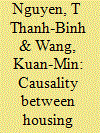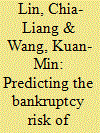| Srl | Item |
| 1 |
ID:
094385


|
|
|
|
|
| Publication |
2010.
|
| Summary/Abstract |
This paper investigates the housing-macroeconomic nexus in Taiwan with endogenous structural breaks during 1991-2006. GDP and CPI are taken into consideration for examining the inflation hedging ability of Taiwan's housing returns and the contribution of the housing market to economic growth. The empirical results show that the growth of GDP actually affects inflation, but it does not cause the growth in housing returns. In particular, when taking the time trend into account, it is found that the effect of inflation on housing returns is negative and the effect of housing returns on inflation is positive. This evidence demonstrates the ineffectiveness of inflation hedging of Taiwan's housing during the period of study and the opportunistic characteristic of investors. In addition, the growth of the housing market is not beneficial for economic growth in the long-run, yet it leads to higher inflation in the short-run.
|
|
|
|
|
|
|
|
|
|
|
|
|
|
|
|
| 2 |
ID:
107486


|
|
|
|
|
| Publication |
2011.
|
| Summary/Abstract |
Using non-probability purposive sampling, this study matched 23 Taiwanese OTC (Over-the-Counter) bankrupt corporations with 23 non-bankrupt corporations during the period 1999-2005. On the basis of the sample, a predictive and secondary research design was conducted to construct a rolling-prediction model and validate its prediction in Taiwan on OTC corporation bankruptcy risks. The empirical results indicated that the rolling-logit model, compared with the benchmark model, exhibited higher overall accuracy. The successful predictive performances were attributed to a recall mechanism in the rolling-logit model, measuring a corporation's risks on the basis of consistent information across time. However, this study had limitations due to the selection of the sample and variables. These limitations suggest that future research could validate its applicability in other markets or select other explanatory variables in order to improve the predictive ability.
|
|
|
|
|
|
|
|
|
|
|
|
|
|
|
|